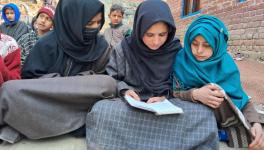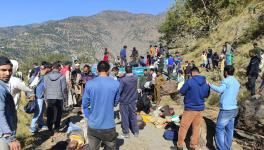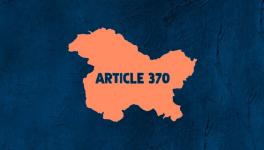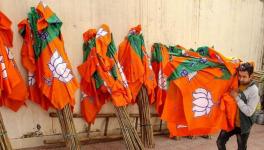Torture in Kashmir: Rights Groups Release Report, Seek UN Probe
Image Courtesy : Kamran Yousuf
Srinagar: Two prominent Kashmir-based rights groups have released a detailed report on torture in Kashmir — titled ‘Torture: Indian State’s Instrument of Control in Indian Administered Jammu and Kashmir’ — and have called for investigation by the United Nations.
The report was released by the Jammu & Kashmir Coalition of Civil Society (JKCCS) and the Association of Parents of Disappeared Persons (APDP) on May 20, and urges India to ratify UN convention against torture.
The report says at least 40 people in 432 case studies that were researched died “as a result of injuries received during torture.” At least 432 individuals investigated had been subjected to waterboarding, beatings with iron rods and leather belts and electric shocks to genitals, it says.
A majority of the torture victims are civilians — 301 out of 432-- which include women, students, juveniles, political activists, human rights activists, and journalists, the report points out.
In the 560-page report, the rights groups call on the UN to establish a commission of inquiry to investigate torture in Kashmir as “not a single the prosecution has taken place in any case of human rights violations in Jammu and Kashmir due to legal, political and moral impunity extended to the armed forces.”
The report focusses on the torture “perpetrated in Jammu and Kashmir by the Indian State since 1990” and “provides a contextual understanding of various phases of torture being perpetrated in Jammu and Kashmir since 1947.”
Also see: Kashmir in 2018: A Year of Bloodshed and Resistance
Using 432 case studies, the report charts out trends and patterns, targets, perpetrators, sites, contexts, and impacts of torture in Jammu and Kashmir.
The report says the torture remains hidden in Jammu and Kashmir, where tens of thousands of civilians have been subjected to it, “despite global attention and condemnation of torture following exposés of indiscriminate torture practiced in Guantanamo Bay and Abu Ghraib prisons, torture remains hidden in Jammu and Kashmir, where tens of thousands of civilians have been subjected to it.”
Besides many cases of torture, the report provides a recent example of a 29-year-old school principal, Rizwan Pandith, who was allegedly killed in police custody in the Cargo Camp of the Special operations group of Jammu and Kashmir Police on 19th March 2019.
“Three days later, the Police filed a case against deceased Rizwan, alleging that he was trying to escape from the Police custody while no case was filed against Police officials under whose custody he was killed,” the report points out.
The forms of torture that have been documented in the report include — stripping the detainees naked (190 out of the 432 cases studied), beating with sticks, iron rods or leather belts (326 cases), roller treatment (169 cases), waterboarding (24 cases), dunking detainees’ head in water (101 cases), electrocution including in genitals (231 cases), hanging from the ceiling, mostly upside down (121 cases), burning of the body with hot objects (35 cases), solitary confinement (11 cases), sleep deprivation (21 cases), sexual torture (238 cases) including rape and sodomy, among others.
“Vast number of methods of torture and other cruel, inhuman and degrading treatment or punishment, as set out in the UN OHCHR Istanbul Protocol, have been and continue to be perpetrated in Jammu and Kashmir,” the report reads.
The report gives a brief understanding of the historical background in the use of torture in Jammu and Kashmir since 1947 “to curb any dissenting voices,” a practice which attained an unprecedented magnitude post-1990, when the armed insurgency began.
It categories the eras after 1990 "during which torture and other human rights violations, while still being carried out by the armed forces and Jammu & Kashmir Police was also outsourced to different formations like Ikhwan and Village Defense Committees (VDCs)".
The report also provides insight into how torture has ruined the lives of survivors with a multitude of them suffering from chronic ailments as result of the torture.
Apart from the physical ailments, the report says, people who have been tortured or even witnessed it have suffered from psychological issues like Post-Traumatic Stress Disorder (PTSD).
“Since many deaths due to torture-related injuries are not immediate but may occur after years or even decades, accurate figures of such fatalities and morbidity are extremely hard to estimate,” it notes.
Torture has been associated with other human rights violations like custodial deaths and enforced disappearances, it added.
Also read: UN Report Flags Excessive Use of Force by the Indian Government in Kashmir
“And it is only when a case of torture is accompanied by such human rights violations that it gets reported in the media. As a result, torture has remained unnoticed and survivors continue to suffer in silence,” the report states.
Castigating the harsh treatment of civilians during counterinsurgency operations, it says “Since policies like Operation, All Out continues in Kashmir and the army is given a “free hand as declared by the Prime Minister of India as recently as 15 February 2019, the armed forces are only emboldened to continue perpetrating torture,” it says. It adds that entire populations have also been subjected to collective punishments like cordon and search operations (CASOs) during which torture and sexual violence have been common.
The report is aimed at breaking the silence around custodial violence, “Torture is used as a matter of policy by the Indian State in Jammu and Kashmir in a systematic and institutional manner, as all the institutions of the State, be it a legislature, executive, judiciary and armed forces form a part,” it says.
India has rejected the first-ever UN report in 2018 on human rights abuses by government forces in Kashmir, terming it “fallacious, tendentious and motivated.”
Get the latest reports & analysis with people's perspective on Protests, movements & deep analytical videos, discussions of the current affairs in your Telegram app. Subscribe to NewsClick's Telegram channel & get Real-Time updates on stories, as they get published on our website.
























